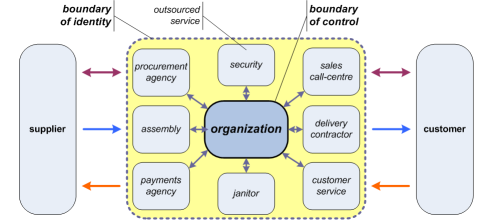More on boundary of identity versus control
Following on from ‘Boundary of identity, boundary of control‘ and ‘inside-out versus outside-in‘, perhaps the quickest way to understand the difference:
- the boundary-of-control delimits what the lawyers think the organisation is
- the boundary-of-identity delimits what everyone else thinks the organisation is
In other words, the difference between an inside-out perspective, focussed on ‘control’, versus an outside-in perspective, focussed on perceived-identity.
Or, if we take that visual summary of outsourcing, control and identity again:
In terms of responsibility and liability:
- from inside-out, the executives, investors and lawyers assume that the organisation’s responsibilities end at the boundary-of-control (of often less than that – hence ‘limited-liability corporation)
- from outside-in, everyone else expects that the organisation’s responsibility extends at least to the boundary-of-identity
Therein lie the source for some very interesting legal clashes… 🙂 – and hence why an enterprise-architecture that does explain that difference between boundary-of-identity versus boundary-of-control can help to take some of the heat out of those clashes.
Another useful selling-point for enterprise-architecture, perhaps?

Leave a Reply